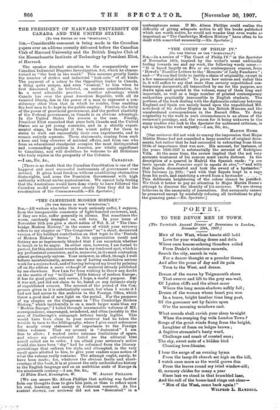THE PRESIDENT OF HARVARD UNIVERSITY ON CANADA AND THE UNITED
STATES.
ITO TIE EDITOR OF TINS "SPDEITATOR:a
Sin,—Considerable comment is being made in the Canadian papers over an address recently delivered before the Canadian. Club of Harvard University and the British Empire Club of
the Massachusetts Institute of Technology by President Eliot, of Harvard.
The speaker directed attention to the comparatively new Canadian Industrial Disputes Investigation Act, which he charac- terised as "the best in the world." This measure greatly limits the number of strikes and industrial " lock-outs " of all kinds. The payment of a salary to the Opposition leader in Canada, a thing quite unique, and even "comical,' to him when he first discovered it, he believed, on mature consideration, to be a most admirable practice. Another advantage which Canada has over the great American Republic, with all its -vaunted liberty, lies in the power of a man to represent a con- stituency other than that in which lie resides, thus enabling the best men to bs kept in the public employ. Further, the fixity of the power of provincial government, and the perfect elasticity of the Federal government, in Canada is an obvious advantage. In the United States the reverse is the case. Finally, President Eliot remarked that since both Canada and the United States are as yet young countries, and in a strictly experi- mental stage, he thought it the wisest policy for them to strive to work out successfully their own experiments, and to remain entirely separate. These statements, coming from such a keen and long observer of national affairs, and from one who from an educational standpoint occupies the most distinguished and commanding position in America, are vitally significant to Canadians, and will doubtless be welcome to all Britishers who truly rejoice in the prosperity of the Colonies.
[There is no doubt that the Canadian Constitution is one of the happiest and most successful instruments of government ever devised. It gives local freedom without establishing obstructive State-rights, and arms the Dominion Government with high authority without undue centralisation. We cannot help feeling that the Australians would have done wisely to have followed the Canadian model somewhat more closely than they did in the construction of the Commonwealth.—En. Spectator.]


















































 Previous page
Previous page